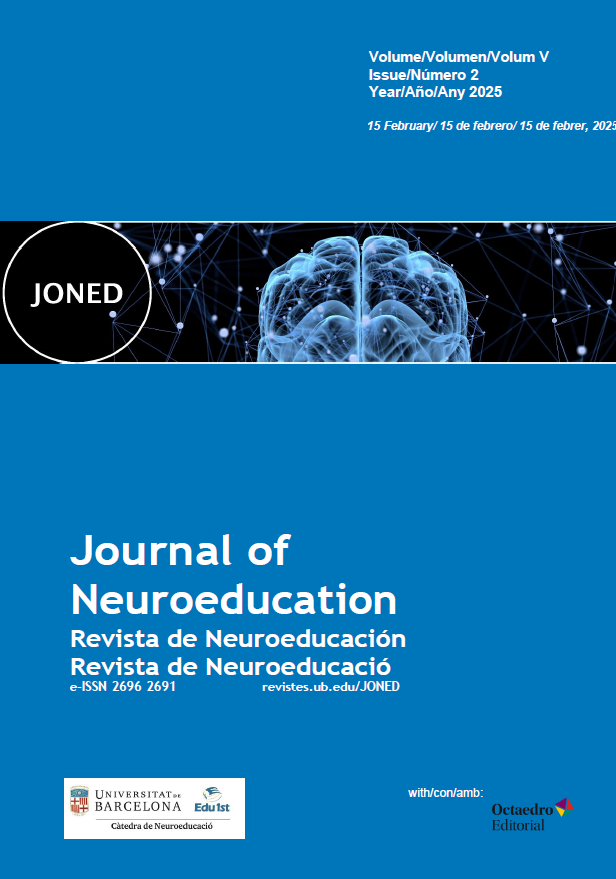La neurociencia cognitiva en el pensamiento matemático en las fases 2 y 3 de la Nueva Escuela Mexicana
DOI:
https://doi.org/10.1344/joned.v5i2.47497Keywords:
Cognitive neuroscience, mathematical thinking, new Mexican school, neuroeducation, neuropedagogyAbstract
The implementation of the educational model of the New Mexican School has revealed a development opportunity series for pedagogical knowledge in the educational system of México. One of them is the inclusion of neuroscientific knowledge in the teaching practice of teachers in the country. This study aims to offer preschool and primary education teachers a series of empirical discoveries about the functioning of the brain and its relationship with the neurobiological phenomenon of learning, but above all, with the influence these cognitive processes have on children’s mathematical thinking development.
Downloads
References
Mora F. Neuroeducación, solo se puede aprender aquello que se ama. Alianza Editorial; 2018.
Caine RN, Caine G. Understanding a Brain-Based Approach to Learning and Teaching. Educ Leadersh. 1990;66–70.
Carvajal R. Diseños Curriculares, Modelos Pedagógicos y Planificación Educativa en Neuroeducación: Perspectivas y Controversias. Docencia Univ. 2019;20(1):47–68.
SEP. Plan de Estudio de Educación Preescolar, Primaria y Secundaria 2022. Secretaría de Educación Pública; 2022. 1–192 p.
Sevilla B. Neuroeducación en Ciclos Formativos: Guía para el Profesorado. Universitat de Barcelona; 2020.
DOF. Política Nacional de Educación Inicial. México: Diario Oficial de la Federación; 2022.
Dirección General de Desarrollo Curricular. Marco Curricular y Plan de Estudios 2022 de la Educación Básica Mexicana. Ciudad de México; 2022.
Center on the Developing Child. En breve, la ciencia del desarrollo infantil temprano. 2007. (En Breve). Report No.: Harvard University.
Poltz N, Quandte S, Kohn J, Kucian K, Wyschkon A, Aster M von, et al. Does It Count? Pre-School Children’s Spontaneous Focusing on Numerosity and Their Development of Arithmetical Skills at School. Brain Sci. 2022;12(313):1–18.
Lynch M. The neuroscience of early childhood development. The Advocate. 2019 Mar 22;
McMullen J, Verschaffel L, Hannula-Sormunen MA. Spontaneous mathematical focusing tendencies in mathematical development. Math Think Learn. 2020;22(4):249–57.
Chu FW, VanMarle K, Hoard MK, Nugent L, Scofield JE, Geary DC. Preschool Deficits in Cardinal Knowledge and Executive Function Contribute to Longer-Term Mathematical Learning Disabilities. J Exp Child Psychol. 2019;188:1–61.
Hannula MM, Lehtinen E. Spontaneous focusing on numerosity and mathematical skills of young children. Learn Instr. 2005;15(3):237–56.
SEP. Campos formativos en la educación preescolar. Programa analítico. 2021.
Hyde DC, Ansari D. Advances in Understanding the Development of the Mathematical Brain. Dev Cogn Neurosci. 2018;(30):236–8.
Domínguez M. Pensamiento Matemático: Estrategias Neuroeducativas en estudiantes de tercero de preescolar. Debates en Evaluación y Currículum/Congreso Int Educ Currículum 2019. 2019;(5):1–12.
Castillo IE. Favorecer el desarrollo del pensamiento matemático en un grupo de primero de preescolar. Benemérita y Centenaria Escuela Normal del Estado de San Luis Potosí; 2021.
SEP. Educación Física. Educación Básica. Plan y programas de estudio, orientaciones didácticas y sugerencias de evaluación. Pública S de E, editor. Ciudad de México; 2017.
Torresi S. Propuesta en acción 1 – Cognición matemática: de la evidencia científica a la práctica fundamentada. In: El ágora de la neuroeducación La neuroeducación explicada y aplicada. Universitat de Barcelona; 2019. p. 103–12.
Dehaene S. The number sense. Oxford University Press; 1999.
Carey S. The Origins of Concepts. Oxford: Oxford University Press.; 2000.
Rosselli M, Matute E. La Neuropsicología del Desarrollo Típico y Atípico de las Habilidades Numéricas. Rev Neuropsicol Neuropsiquiatría y Neurociencias. 2011;11(1):123–40.
Dubinsky JM, Roehrig G, Varma S. A Place for Neuroscience inTeacher Knowledgeand Education. Mind, Brain Educ. 2022;1–10.
Silva CV. La neuroeducación en preescolar para la enseñanza de las matemáticas. In: XXI CONCURSO LASALLISTA DE INVESTIGACIÓN, DESARROLLO E INNOVACIÓN CLIDi 2019. 2019. p. 1–6.
Forero CP. Aportes de la neuroeducación a la formación de los futuros pedagogos infantiles [Internet]. Corporación Universitaria Minuto de Dios; 2016. Available from: https://repository.uniminuto.edu/bitstream/handle/10656/4438/TPED_ForeroMesaClaudiaPatricia_2016.pdf?sequence=1&isAllowed=y
Torresi S. Acerca de números, dificultades e intervenciones. J Neuroeducation. 2020;1(1):136–40.
Downloads
Published
Issue
Section
License
Copyright (c) 2025 Alejandro Díaz-Cabriales

This work is licensed under a Creative Commons Attribution-NonCommercial 4.0 International License.
The authors who publish in this journal agree to the following terms:
a. Authors retain copyright and grant the journal the right of first publication
b. Texts will be published under a Creative Commons Attribution Non Commercial License that allows others to share the work, provided they include an acknowledgement of the work’s authorship, its initial publication in this journal and the terms of the license, and not for commercial use.



